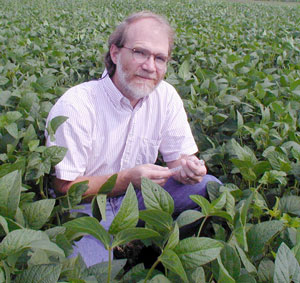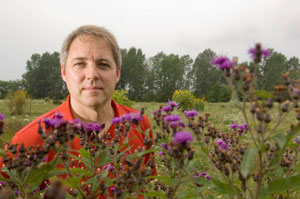Journal shines spotlight on long-term ecological research
The Long Term Ecological Research Project at the Kellogg Biological Station contributes valuable research to the field.
For more than 20 years, Michigan State University has been a part of the Long-Term Ecological Research program (LTER), a National Science Foundation-funded project to conduct research on ecological issues that can last decades and span huge geographical areas.
In celebration of the LTER program, which has been in existence for nearly 30 years, six new papers relating to the importance of such long-term research were recently published in the scientific journal BioScience. MSU AgBioResearch scientists Phil Robertson and Doug Landis are among LTER researchers with articles published in the journal. There are more than 26 sites throughout the world, including the KBS LTER site at the MSU W.K. Kellogg Biological Station near Kalamazoo.
Robertson, who has led the KBS LTER for those 20-plus years, is the lead author of the first article in the BioScience series. His piece notes the success of the program in documenting and understanding environmental changes that are difficult to detect in short-term studies.
“As we move into an era where human decisions affect even the most remote ecosystems, we need more than ever to understand how decisions cause ecological change both planned and inadvertent,” said Robertson, a university distinguished professor of crop and soil sciences. “Many of these changes take a long time to play out, and LTER helps us to understand their underlying origins and effects.”
Since 1988 — the year that KBS joined the LTER network — hundreds of scientists have visited this rural landscape in southwestern Michigan, where research is focused on agricultural ecosystems. They come to address the pressing agricultural challenge of how to provide the food and biofuel feedstocks needed by society while improving sustainability and minimizing negative environmental consequences.
Unlike most grant-funded research that spans a few years, LTER studies are often sustained over decades, documenting gradual changes and sudden surprises that often cannot be revealed by short-term studies.
“Long-term field experiments are critical for discovering the causes and consequences of environmental change,” said Landis, a professor in the MSU Department of Entomology. “Even in managed ecosystems such as Michigan field crops, we can miss the boat without a long-term perspective.”
MSU AgBioResearch Director Steve Pueppke said the long-term research conducted at the LTER provides an opportunity to understand the past and help forecast future environmental change.
“This network of long-term experiments taking place in climates from polar to tropical, from maritime to continental, and in ecosystems that range from Antarctic valleys to Michigan cropland, is crucial to solving many of the environmental problems facing society today,” Pueppke said.



 Print
Print Email
Email





